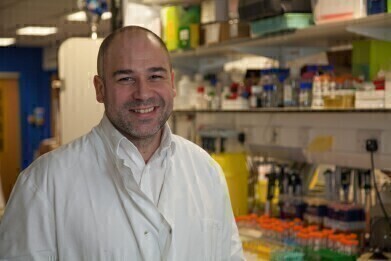-
 Kevin Rouault-Pierre (Credit; Francis Crick Institute)
Kevin Rouault-Pierre (Credit; Francis Crick Institute)
News & Views
Vitamin B5 offers promise for new MDS therapies
Mar 13 2023
“Understanding the biology behind this stem cell disorder is key to unlocking new treatments of the future.” Kevin Rouault-Pierre
People with Myelodysplastic syndromes (MDS), a rare type of blood cancer affecting production of healthy red blood cells, could go on to develop acute myeloid leukaemia (AML). While no curative treatments are currently available for this condition, some medications do help to slow the disease progression – however around 50% of patients become resistant to existing drugs for MDS within 18 months to two years of treatment. Patients are also heavily reliant on red blood cell transfusions which can be painful and dangerous due to iron overload in the blood highlighting the need for newer therapies.
Scientists from Barts Cancer Institute at Queen Mary University of London and the Francis Crick Institute, analysed blood samples from 42 people with MDS and found that the enzyme COASY is critical in regulating red blood cell production in the bone marrow, with partial loss of the enzyme leading to anaemia.
They then tested whether they could boost red blood cell production by supplementing treatments and found that inclusion of vitamin B5 or another metabolite, succinyl-CoA, increased the maturation of red blood cells.
Kevin Rouault-Pierre, Group Leader at Barts Cancer Institute and supervisor of the study, said: “Current treatments for MDS are often associated with reduced quality of life as well as the increased risk of progression to leukaemia. Understanding the biology behind this stem cell disorder is key to unlocking new treatments of the future.”
“Our next steps will be to further investigate how to boost red blood cell production and work towards testing new treatments in clinical trials.”
Syed Mian, postdoctoral research fellow in the Crick’s Haematopoietic Stem Cell Laboratory, who co-authored with Celine Philippe postdoctoral training fellow at Barts Cancer Institute, said: “Given our elderly population is increasing and age is the dominant risk factor for the development of MDS, we will start to see more and more people with this type of blood cancer.
“Anaemia-related symptoms, such as chronic fatigue, are commonly reported in MDS and the current red blood cell transfusions, although essential, come with potential complications and also require substantial human and financial resources. Therefore, it’s essential that we find alternative ways to regulate long term red blood cell production in these patients. Our results may also potentially help with treatments of other diseases where patients commonly present with anaemia.”
Published in Science Translational Medicine.
Further information online
Digital Edition
Lab Asia 31.2 April 2024
April 2024
In This Edition Chromatography Articles - Approaches to troubleshooting an SPE method for the analysis of oligonucleotides (pt i) - High-precision liquid flow processes demand full fluidic c...
View all digital editions
Events
Apr 22 2024 Marrakech, Morroco
Making Pharmaceuticals Exhibition & Conference
Apr 23 2024 Coventry, UK
Apr 23 2024 Kintex, South Korea
Apr 23 2024 Seoul, South Korea
Apr 24 2024 Jakarta, Indonesia







.jpg)









